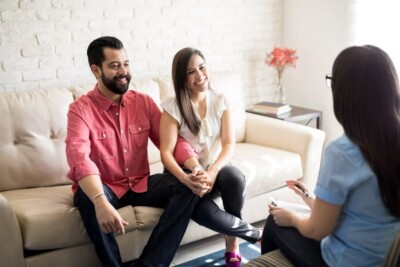3 Signs You May Be in a Codependent Relationship: From a Relationship Counselor in Georgia
by Sadé Ferrier
If you have visited this article, there’s already a chance that something resonated with you in the title. In other words, you already suspect that you and your partner may be in a codependent dynamic. But in a world with labels and red flags for seemingly everything, how can you know what codependency truly is – and, even more importantly, how to change it so that you can have a thriving, secure relationship?
Enabling
One of you has a habit or behavior that is unhealthy, damaging or harmful – and the other partner is either turning a blind eye, making excuses, or stopping their partner from experiencing the negative consequences earned by such unhealthy behaviors.
Have you seen the show, My 600lb Life, on TLC? A common theme with the couples on the show is that one partner (or family system) enables the patient by continuing to cook inappropriate proportions of food, make fast food runs for unhealthy options, or assist their loved one in a way that doesn’t allow them to fully confront the limitations and negative consequences of continuing in their lifestyle.
In relationships, enabling can be related to unhealthy behaviors or abuse of substances – but it can also be related to your day-to-day dynamic. If your partner doesn’t know much about finances and seems completely uninterested in learning the skills of budgeting and financial management, you may up the slack and make sure that your lifestyle is kept afloat. There are no negative consequences to their lack of motivation, so the impulsive spending and careless financial decisions can continue without issue. Or perhaps you don’t know how to do basic lifestyle tasks like cooking, cleaning, or calling to make a doctor’s appointment. If your partner is doing all of the cooking, all of the cleaning, and handling the scheduling of all important appointments, you are likely in a codependent relationship.
What Should I Do?
If you suspect that you are being enabled by your partner, begin with a conversation and let them know that you desire to “step it up” in the relationship and take more responsibility. Ask them to step back from filling the gaps so that you can learn your own way of getting things done. If you need help, try to seek answers by pausing and using your own critical thinking, or by looking up answers online. This way, your partner doesn’t continue to be a crutch or “parent” in your life.
If you suspect that you are enabling your partner’s habits, you can move against the grain by allowing your partner to figure out their path for themself. I won’t sugarcoat it; you may be surprised by the discomfort and anxiety that you’ll feel. Your partner may not do things the way you want them to, or may continue to spiral deeper into their unhealthy habits. This is all part of the process of breaking codependency. They must decide for themselves what is best and what they value. So, no more buying their cigarettes or paying their overdue bills. They must confront their own negative consequences.
No Free Time or Space
If you or your partner aren’t able to enjoy free time for hobbies, social engagements, or even personal rest, there is a chance that codependency is in play. This is often seen in relationships where one partner has anxious attachment. Space may feel like a threat to the relationship, a bad omen of separation or lack of interest. There are no boundaries between who you are and who your partner is, leading to an enmeshed dynamic – that is, a big combined blob – where you don’t know who you are outside of the relationship. Everything must be done or experienced together, and the idea of having personal interests feels overwhelming or completely unappealing.
This issue likely existed before the two of you got together. You may subconsciously have desired someone in your life to alleviate feelings of boredom, worthlessness, or the fear of being alone forever. These emotions are valid and often a normal part of the human experience. The problem comes when we don’t address those feelings, but rather use romantic or sexual validation as a bandaid to make the discomfort go away.
What Should I Do?

Start by spending small increments of time apart: whatever is slightly more than your usual comfort level. For example, try an hour of alone time, even if your partner isn’t busy and is technically able to hang out. You may want to take up a new hobby, get into a great book, or go for a walk in nature. Doing activities to build new friendships will also help take the pressure off of your relationship. It can be damaging to the health of your “relationship plant” when your partner is the end-all-be-all for meeting every one of your emotional needs.
You may also want to space out communication with your partner. No, not as a game to try to get their attention or manipulate them. Instead of checking your phone often, waiting for a text, try turning it off or putting it in another room when you’re spending quality time with friends and family. Instead of texting all day, reduce communication to at night after work so that you can be fully present. If you’re in the dating phase, try 3 dates a week instead of 7. If you’re married or in a long-term committed relationship, encourage your partner to spend time with their friends as well – without the guilt-trip of how much you’ll miss them when they’re gone.
To learn more about anxious attachment and how attachment styles impact relationships, read Attached by Adam Levine. It is a great resource that offers practical examples and insight into the push-pull of anxious and avoidant dynamics.
You Never Argue
Arguments and disagreements can’t be avoided in intimate relationships. After all, you’re two separate beings! What matters, though, is how you argue.
 If you don’t have any disagreements or conflict, you may want to consider what valid emotions or perspectives are being brushed under the rug in order to “keep the peace.” Often times, individuals who grow up in families that never addressed conflict have weaker conflict resolution muscles. Avoidance is extremely high, and so all efforts are directed towards keeping tension low in the relationship. You may relate to words like, “I’m fine” or “That’s life,” and an inability to acknowledge inner hurt, sadness, anger, or grief.
If you don’t have any disagreements or conflict, you may want to consider what valid emotions or perspectives are being brushed under the rug in order to “keep the peace.” Often times, individuals who grow up in families that never addressed conflict have weaker conflict resolution muscles. Avoidance is extremely high, and so all efforts are directed towards keeping tension low in the relationship. You may relate to words like, “I’m fine” or “That’s life,” and an inability to acknowledge inner hurt, sadness, anger, or grief.
What Should I Do?
Maybe you feel really alarmed after reading this. You’re wondering what to do now that you realize you may be in a codependent relationship. First, take some time – either with a trusted friend or individually with a journal – to think about your needs in the relationship. It simply is not true that you have no needs.
Once you have discovered something that would help you feel more loved, known, or secure in your relationship, think of a way that you’d like your partner to help you meet that need. For example, if you’d like a bit more help taking care of your child, think of one way that you’d appreciate your partner stepping up to the plate. Or, if you want to feel more sexually-desired, think of one thing your partner could do more or less of that would help.
The next step is simple: approach your partner to communicate your need. Not in a moment of pre-existing tension, but in a neutral moment where you will be seen and heard. If you are not sure how to do one of the above steps, sitting with a relationship counselor can help you find the words to break your codependency cycle and develop your conflict resolution skills.
You Can Have a Strong, Secure Relationship

Your codependent relationship may have been stuck in the same pattern for months, years, even decades. While these dynamics are challenging to break, you don’t have to do it alone! Counseling with licensed professional counselors or marriage and family therapists who specialize in relationships can offer an unbiased perspective into the subtle ways that you can make drastic changes in your relationship. By practicing new ways of communicating in therapy, you can have the tools to do things differently in your everyday life.
Building Intimate Marriages in Suwanee, Georgia, focuses on all stages of relational growth: dating, premarital, newlyweds, marriage/relationship counseling, and even discernment counseling for those considering separation or divorce. Contact our Client Care Coordinator via email or phone to schedule your first session.
Author
Sadé Ferrier, LMFT is a therapist at Building Intimate Marriages in Suwanee, Georgia, focusing on sex therapy and intimacy issues. She especially loves working with clients who have a background with anxious attachment, spiritual deconstruction, vaginismus, or low sexual desire.




